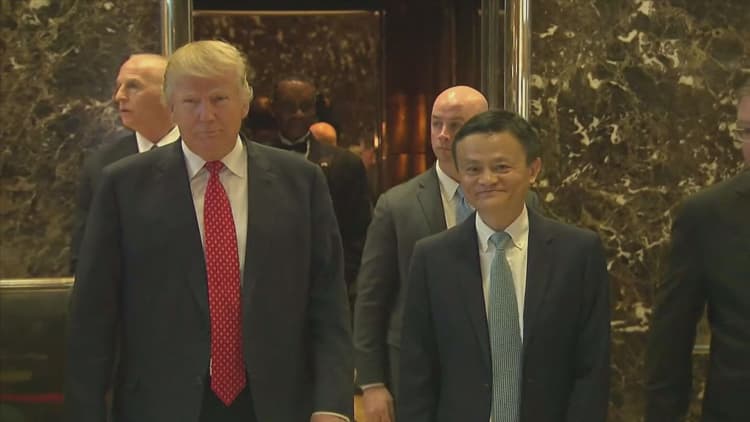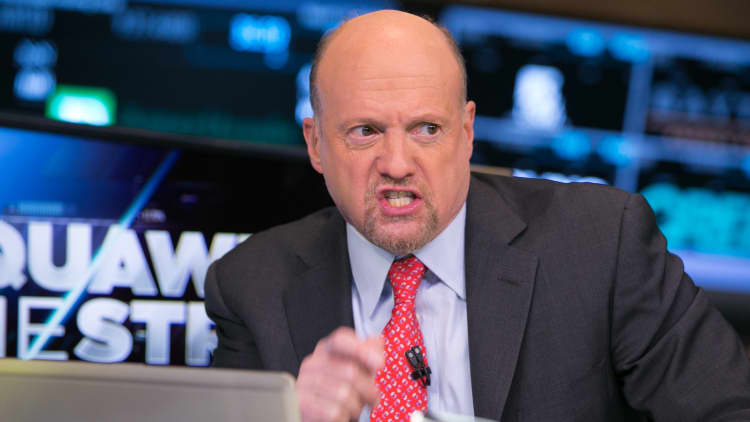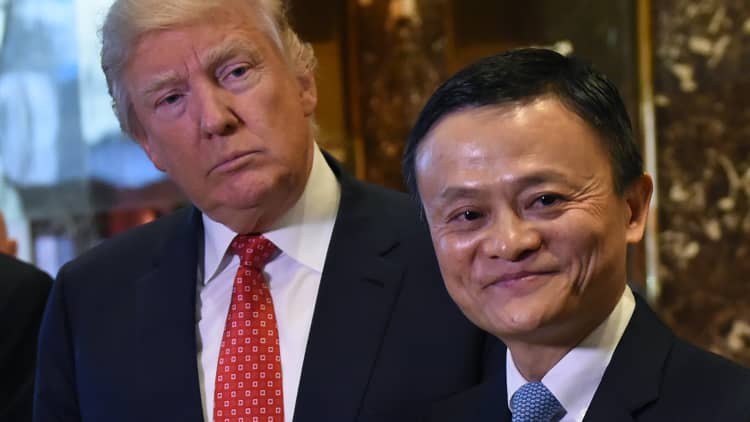
Alibaba founder Jack Ma's visit to Trump Tower this week wasn't just the latest example of a foreign business leader cozying up to the president-elect.
Ma, whose Chinese online retailer is more valuable than all but 12 U.S. corporations, is perhaps the best known business executive in the country Donald Trump most frequently attacked during his campaign for taking advantage of unfair trade deals.
Ma smartly decided to pursue face time with Trump. And Ma came bearing a promise: to help create 1 million U.S. jobs by enabling small businesses to sell goods on Alibaba's prosperous e-commerce platform.
It played right into Trump's boisterous pledge to boost growth and get Americans working again (despite a nine-year low in unemployment).
But experts who have spent years tracking Alibaba and Chinese online commerce aren't buying Ma's pitch.
"Jack Ma is great at PR and Trump is a sucker for anybody who kisses his whatever," said Harley Lewin, a partner at New York law firm McCarter & English who has spent 40 years protecting brands and fighting infringement globally. "Ma is going to say that because those are the buzzwords that appeal to the incoming administration."

While the idea of an American entrepreneur developing a product and using Alibaba to distribute it in a country with over 1.3 billion people is enticing, the reality is much more complicated. U.S. companies face big challenges when doing business in China, including government subsidies for domestic products, the costs of moving goods and piracy.
Ma says he's here to help. But there's a problem.
Alibaba is a haven for counterfeits. In December, Taobao, Alibaba's consumer website, was put back on the "notorious marketplaces" blacklist by the Office of the United States Trade Representative.
Taobao had been removed from the list in 2012 after making efforts to protect intellectual property rights holders, but "current levels of reported counterfeiting and piracy are unacceptably high," the trade office said.
In Lewin's extensive work in China, he has noticed a consistent pattern: When a product or category proves to be popular, the number of counterfeits explodes, and brands are powerless to stop it, no matter how much policing they do. Ma even acknowledged in a speech in June that the fakes are often of "better quality, better prices than the real products, the real names."
Amazon vs. Alibaba
"It makes sales into China prohibitive," Lewin said. "You can't compete with the volume of selling of fakes on the internet."
That's not all. Once a company has introduced its product to Chinese counterfeiters, they can start selling their knockoffs globally, whether on Alibaba, Amazon.com or eBay. That makes Chinese counterfeiting a problem that extends far beyond China.
Alibaba spokesman Robert Christie told CNBC that there are certain categories of products that Chinese consumers only want to buy from businesses outside the country, and Alibaba is targeting brands that can fulfill that demand.
Christie referred back to an op-ed that Ma wrote in The Wall Street Journal in June 2015, outlining Alibaba's strategy for luring U.S. businesses. Ma said items like fresh foods, cosmetics and baby products present a particular opportunity for sellers in Europe and the U.S. to crack the Chinese market.
"If you ingest something or it touches their skin, they don't want it made in China," Christie said. "That's everything from makeup to vitamins to lotions to clothes. We know there's big demand for that in China."
In the meeting with Trump, the headline number that Ma laid out was 1 million new businesses over five years, Christie said. The million new jobs assumes one employee per business.
As for the counterfeit problem, Alibaba Vice Chairman Joseph Tsai said in an interview in November that the company has spent years developing systems to enforce IP protection and crack down on piracy. The site uses homegrown technology to scour 10 million listings a day and takes down an average of 25 listings for every complaint, Tsai said.
Over 100,000 brands, including 75 percent of the world's most valuable consumer names use Alibaba to access China, according to Christie.
Brands like Apple, Disney and Nike "would not be using Alibaba as their gateway to the China market if they did not believe we were an honest broker with an ongoing, rock-solid commitment to protecting their intellectual property," he said. "We are actively using our big data capabilities not only to remove suspect products from our site, but also to help put counterfeiters in China behind bars."
The problem that Ma's created has cost the U.S. millions of jobs.Rob Dunkelfounder of 3PM Marketplace Solutions
There's another reason to be skeptical of Ma's expressed affinity for the American small business.
Because of the extremely low barrier in place for Chinese merchants to sell into the U.S. — the type of "terrible deal" Trump railed against throughout his campaign — Alibaba has served as a platform for cheap Chinese goods to enter the U.S. and undercut domestic competitors.
While Taobao has failed to crack the U.S. consumer market, Alibaba.com and the AliExpress site have served as suppliers to U.S. retailers, who turn around and sell those products at higher prices on Amazon and elsewhere.
That inventory includes counterfeits and knockoffs as well as legitimate products priced far below what American companies can reasonably charge.
"The problem that Ma's created has cost the U.S. millions of jobs," said Rob Dunkel, founder of 3PM Marketplace Solutions, whose technology helps brands protect themselves against fraudulent activity. "Why should we believe you now?"
Dunkel has some additional advice for the president-elect: "The question Trump should be asking is, `What's Jack's plan to protect U.S. companies' IP?'"
A Trump spokesperson didn't respond to a request for comment.
The Trump-Ma affair was just an initial meeting and until Trump takes office on Jan. 20, nobody can predict how much of his anti-China trade rhetoric morphs into policy.
If Trump is truly concerned about boosting the competitiveness of U.S. companies, particularly with respect to China, he'll first need to get a grasp on how platforms like Alibaba are opening the door to the imbalances he proclaims to detest.
According to the Counterfeit Report, counterfeiters destroy some 750,000 U.S. jobs and cost domestic businesses over $250 billion a year.
"I'm not sure people understand how endemic an issue this is," said Rania Sedhom, managing partner of New York-based Sedhom Law Group, which represents brands that sell online. "I don't think the government as a whole understands the true consequences and where the money is going."
WATCH: Alibaba's Jack Ma says job creation will focus on small business



